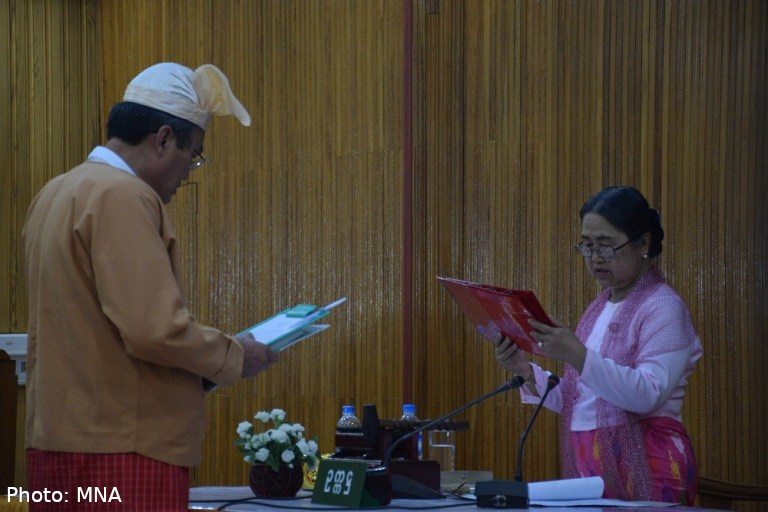Do misunderstandings of the parliamentary rules and regulations impair the checks and balances of the legislative and executive branches of government?
October 2, 2019
HURFOM: 49 questions were to be raised during the 14th regular meeting of the second-term of the Mon State Parliament, but the Mon State government replied on September 17 that they could answer only 25 questions.
The government sent a letter to parliament, explaining that the questions had to be sent to particular departments and the designated Ministers needed time to approve and add some comments to the answers. As a result the unanswered questions would have to be addressed in the next meeting.
However, the Speaker of Parliament interpreted the government’s explanatory letter as an attempt to use its executive power to interrupt parliamentary procedures.

“Instead of supervising its departments that could not answer the questions raised by the parliament in time, I feel that the government has tried to influence our parliament. The government must pressure the departments that failed to answer our questions. But [instead of doing that] why [did] they request parliament not to ask the questions; or to ask the questions next time. Only laws can influence our parliament. But no one can influence us,” said Daw Tin Ei, the Speaker of the Mon State Parliament, to the local media on September 19, 2019.
Daw Tin Ei added that “Democracy is strong and durable only when parliament is powerful. The (Mon State) Chief Minister should manage his cabinet well but instead of doing that, he sent a letter (of complaint) to us. I see that [as an] action
[attempting to]
interrupt the procedures of the parliament.”
The Deputy Speaker of the Mon State Parliament, Dr Aung Naing Oo, said the disagreement between the government and the parliament is based on a misunderstanding of the rules and regulations of parliament.
“When there is a misunderstanding of the rules and regulations of parliament, there will be a challenge in implementation. There will be a weakness also. Instead of arguing about that, we should find a solution. If we can’t get solution, conflict can happen. So we should find where we can settle this misunderstanding,” said Dr Aung Naing Oo.
According to the parliamentary regulations, a lawmaker who wants to raise questions to the government must send his or her questions 10 days in advance [of the parliamentary session] to the Speaker. If there is a failure to send the questions during the designated period, questions can only be accepted by the Speaker if the particular government department agrees to answer the questions.
Parliamentarians interpreted this regulation to mean, particular ministers could decide what they would answer and what they would not answer. This misunderstanding has created an argument between the executive and legislative branches of Mon State.
Dr Aung Naing Oo said, “Every lawmaker wants to raise their questions (in parliament) that were already sent during the designated period. No one can deny that. On the other hand, (the parliament) has given enough time to (the government) to answer the questions. So the government must understand the situation and should answer the questions.”
Lawmakers Daw Khine Khine Lei from Thaton constituency emphasized that raising questions to the government is not driven by personal interests, but rather are questions developed from letters that lawmakers receive from the people they represent.
“It’s our duty to raise questions (to the government). Accepting our questions or not is up to the Speaker. There is no personal interest when we raise questions. The lawmakers raise questions after reading the complaint letters and listening to the voices of the people,” said Daw Khine Khine Lei.
Another lawmaker U Zaw Zaw Htoo echoed this sentiment, pointing out that questions raised by the lawmakers are based on the needs of the people — so the government should answer the questions at the parliament meeting.
“I raised a question related to the landslide incident at Ma Lat Mount, Thel Phyu Gone (village track), Paung Township that happened on August 9. If the government is not ready to answer this question, we feel [that we are not fulfilling our duties, especially] if something bad happens again to the local people,” said U Zaw Zaw Htoo.
A representative of the Mon State government offered another perspective.
“The parliament has sent questions to (the government). After receiving the questions, we have to send them again to the particular (government) departments. Some questions aren’t related to only one department. They need answers from different, [but] related departments. So we have to ask all related departments. After getting an answer from the departments, we have to type them and make a Word document. Then the (particular) minister has to approve them. So there is a shortage of time. For instance, if I receive 20 questions, I can’t answer them in time. That’s a problem,” said Dr Min Kyi Win, a member of the Mon State Cabinet.
Speaker Daw Tin Ei attempted to find some common ground in reminding all the parliamentarians that while the government holds the executive power, the parliament, holds the legislative power. These two bodies are separated and neither should attempt to interrupt or prevent the other from their joint task of governance, and most importantly, both must exercise mutual respect.
This is not the first time the Mon State parliament and government have had a disagreement regarding parliamentary procedures. On May 9, 2019, the Mon State Chief Minister, Dr Aye Zan sent a letter to the 13th regular meeting of the second-term of the Parliament. Dr. Aye Zan’s letter cited that Deputy Speaker Dr Aung Naing Oo should not have raised questions at the parliament meeting. In this case, Speaker Daw Tin Ei decided that in accordance with rules and regulations of parliament, the Deputy Speaker is allowed to raise questions during the parliament meeting.
The Chief Minister withdrew his complaint the next morning.
Comments
Got something to say?
You must be logged in to post a comment.



















































